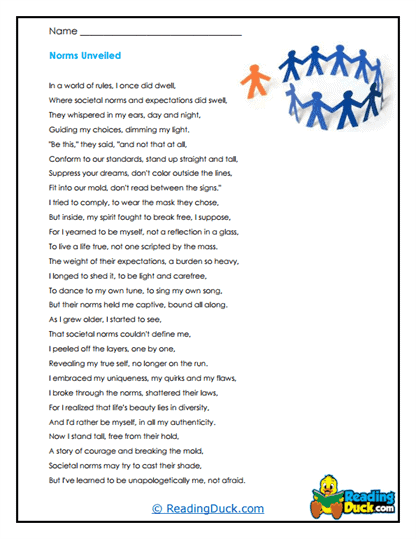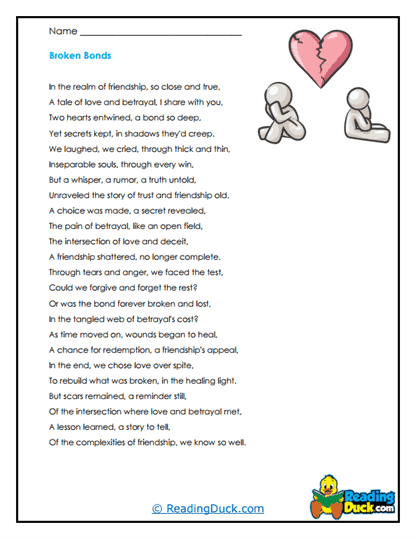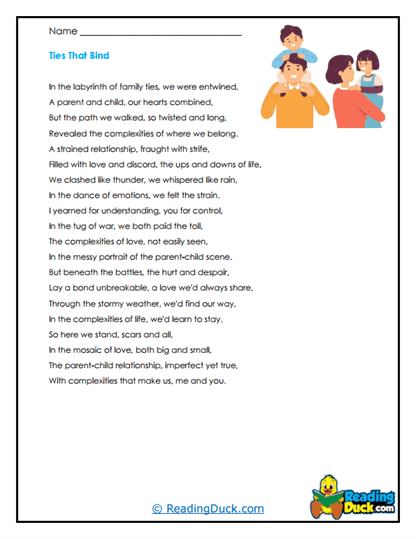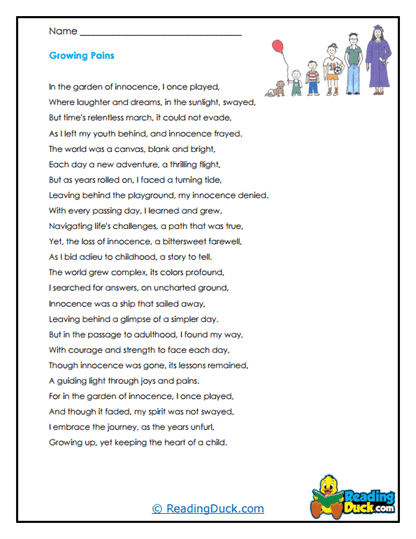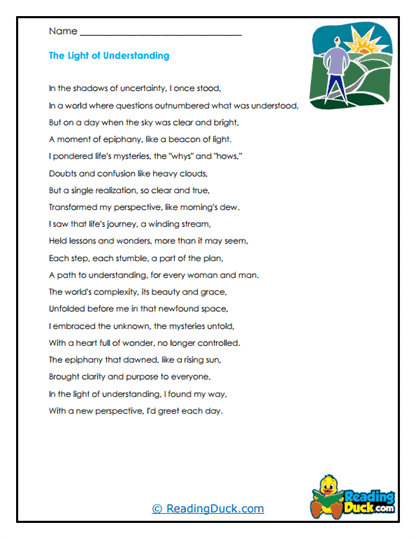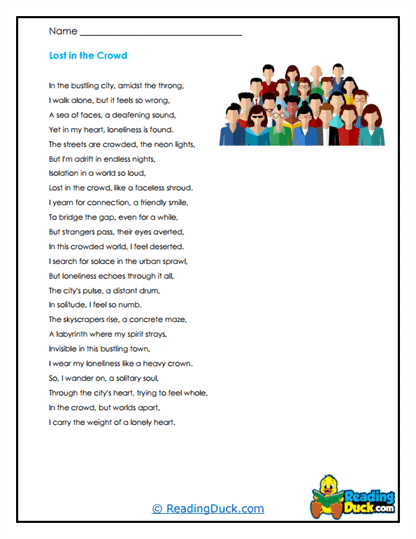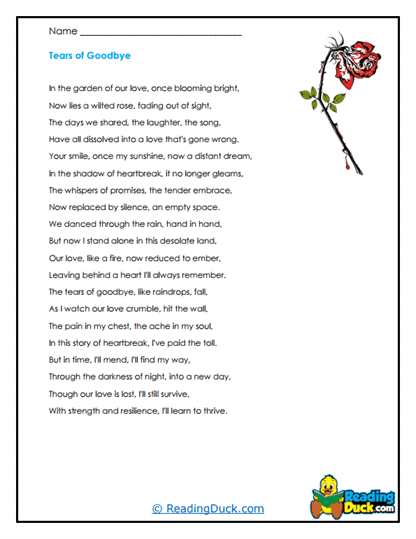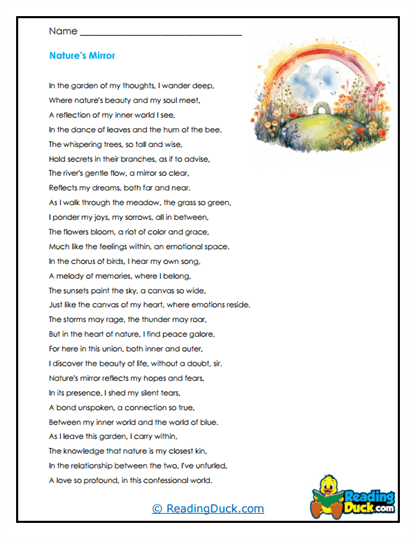Confessional Poetry Worksheets
About Our Confessional Poetry Worksheets
Our Confessional Poetry Worksheets provide an enriching and engaging resource for students to explore one of the most emotionally charged and personal genres of poetry. This collection is part of the Reading Poetry category within the broader Genres section, designed to offer students an immersive experience in analyzing and understanding the confessional poetry genre.
Each worksheet set includes a carefully selected confessional poem, followed by a variety of question types—multiple-choice, short answer, and open-ended response questions—that help students engage with the material in multiple ways. The multiple-choice questions focus on comprehension and key literary elements, while short answer and open-ended questions allow students to delve into deeper analysis and personal interpretation. Every worksheet is presented in an accessible PDF format, allowing for easy viewing, downloading, and printing. Each set also includes a downloadable answer key, making it convenient for teachers to assess and grade student responses efficiently.
These worksheets are a flexible educational tool, adaptable for various teaching environments, including classrooms, homeschooling, or independent study, and provide students with a structured yet creative approach to confessional poetry.
Understanding Confessional Poetry: Themes, Characteristics, and Importance
Confessional poetry is a unique and highly personal genre of poetry that emerged in the mid-20th century, characterized by its raw and candid exploration of the poet’s innermost thoughts, feelings, and experiences. Poets such as Sylvia Plath, Robert Lowell, Anne Sexton, and John Berryman became known for their deeply autobiographical works, often addressing topics like mental health, relationships, trauma, and identity. What sets confessional poetry apart is its emphasis on revealing the poet’s inner life, often dealing with uncomfortable or taboo subjects, which invites readers to connect on a personal level.
Confessional poetry offers students the opportunity to explore complex emotions and themes in a way that encourages both introspection and critical analysis. The genre’s intimate focus on personal experience, often conveyed through vivid imagery and emotionally charged language, provides a powerful lens for students to examine how poets use form, structure, and language to communicate their deepest emotions and life experiences.
This genre is essential for poetry studies as it challenges traditional notions of poetry as an abstract or detached art form, instead presenting poetry as a medium for raw human expression. Through our Confessional Poetry Worksheets, students will explore how poets use confessional poetry to break down barriers between the personal and the public, allowing for a deeper understanding of both the human condition and the power of poetic expression.
- Key Themes: Personal experiences, mental health, trauma, relationships, and identity.
- Characteristics: Autobiographical, emotional, often taboo subjects.
- Importance: Encourages introspection, empathy, and a personal connection to poetry.
Our worksheets, available in PDF format for ease of use, help students navigate the intricacies of this genre while providing teachers with a convenient answer key for efficient grading and assessment.
Developing Critical Skills through Confessional Poetry
Our Confessional Poetry Worksheets are designed to help students develop a variety of critical academic skills, particularly in the areas of reading comprehension, critical thinking, and creative expression. By engaging with the personal and emotional nature of confessional poetry, students are encouraged to think deeply about the themes, literary devices, and language that make this genre so impactful.
The multiple-choice questions in each worksheet help solidify students' understanding of the poem's structure, themes, and use of literary devices such as metaphor, symbolism, and rhythm. For example, students might be asked to identify how a poet’s choice of metaphor reveals their emotional state or how the structure of the poem mirrors the ebb and flow of the poet’s thoughts. Short answer and open-ended questions go a step further, encouraging students to explore their interpretations and connect with the text on a personal level.
By working through these questions, students will gain confidence in their ability to analyze complex poetry and will develop a more nuanced understanding of how poets use language to convey meaning. These skills are not only valuable for literary studies but also foster critical thinking that students can apply to other disciplines.
- Comprehension: Engage with the poem’s language, themes, and structure.
- Critical Thinking: Analyze and interpret complex literary devices and themes.
- Creative Expression: Encourage students to connect personally with the material.
These worksheets not only help students build these foundational skills but also make the often daunting task of analyzing poetry more accessible and engaging.
Flexible Resources for Different Learning Environments
One of the most valuable aspects of our Confessional Poetry Worksheets is their flexibility, making them an ideal resource for various educational settings, whether used in the classroom, at home for homeschooling, or as part of an independent study program. These worksheets can be easily adapted to suit a range of instructional approaches and learning objectives, providing both teachers and students with the flexibility needed to accommodate different learning styles and environments.
In a traditional classroom setting, these worksheets can be used as part of a larger poetry unit, integrated into group projects, or assigned as individual work. Students can work collaboratively to analyze a poem’s themes or create presentations that explore the emotional and literary complexity of confessional poetry. In homeschooling environments, these worksheets provide a structured approach to poetry study, with clear questions and tasks that guide students through both comprehension and deeper analysis. For independent learners, these worksheets offer a self-guided opportunity to engage with poetry at their own pace, allowing them to explore personal reflections and connections with the genre.
The worksheets are also ideal for enrichment assignments, providing advanced students with the opportunity to delve deeper into the nuances of confessional poetry, or for differentiated instruction, where teachers can tailor the difficulty level of questions based on individual student needs.
- Classroom Use: Group projects, individual work, or integrated lesson plans.
- Homeschooling: Structured, guided poetry study.
- Independent Study: Self-paced learning opportunities.
- Enrichment Assignments: Advanced learning and deeper exploration of the genre.
Fostering Analysis and Interpretation Through Close Reading
Confessional poetry, with its focus on personal expression, lends itself perfectly to close reading techniques that foster critical analysis and deeper interpretation. Our worksheets guide students through the process of analyzing confessional poems, prompting them to focus on literary devices, themes, and the poet’s use of language to express personal experiences and emotions.
By using thoughtful, genre-specific questions, students are encouraged to look beyond the surface meaning of the text and examine how the poet’s choices in form, imagery, and diction contribute to the overall emotional impact of the poem. For example, students may be asked to analyze how a poet’s use of enjambment mirrors the chaotic nature of their thoughts or how the repetition of a specific word or phrase emphasizes a particular emotion.
These worksheets help students build the confidence and skills necessary for poetry analysis, showing them how to approach each poem as a complex, layered text that requires careful attention to detail. Through this process, students will develop a deeper appreciation for how poets in the confessional genre use their personal experiences to explore universal human emotions and struggles.
- Close Reading: Examine the poem’s structure, language, and literary devices.
- Critical Interpretation: Understand the deeper meaning behind the poet’s choices.
- Analysis Skills: Build confidence in approaching complex literary texts.
Encouraging Creative Expression and Poetry Writing
An essential part of studying poetry is learning to create it. Our Confessional Poetry Worksheets not only guide students through analyzing this genre but also encourage them to engage in creative expression by writing their own confessional poems. Through guided prompts and exercises, students are encouraged to draw upon their own personal experiences, emotions, and thoughts to craft poems that mirror the confessional style.
By reflecting on themes such as identity, personal struggles, or emotional journeys, students gain a deeper understanding of how confessional poets use poetry as a form of self-expression and catharsis. These creative writing exercises allow students to apply the poetic techniques they’ve studied, such as metaphor, imagery, and rhythm, in their own work, helping to solidify their understanding of the genre’s characteristics.
- Guided Prompts: Encourage personal reflection and creative writing.
- Application of Techniques: Use poetic devices studied in class to create original poems.
- Creative Expression: Explore personal experiences through the medium of poetry.
Through this blend of analysis and creation, students not only gain a deeper appreciation for confessional poetry but also become more confident in their own ability to express themselves through writing.
